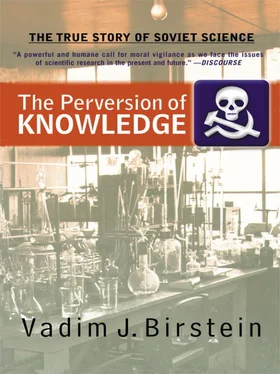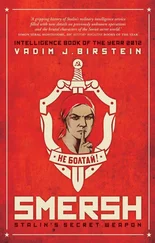From February 1952, Ryumin also headed the “investigation” team that interrogated Abakumov 43and the arrested Jewish doctors (Chapter 1). The cruelty of Ryumin’s “interrogations” was described by Aleksandr Solzhenitsyn in The Gulag Archipelago . 44Later, the investigators rejected the spy version of Mairanovsky’s accusation.
There is very little information about the investigation of Mairanovsky’s case and his trial. Evidently, poisons played the main role. In his 1955 letter to Khrushchev, Mairanovsky blamed his colleagues for his arrest:
I… was forced to keep some of the “things” [i.e., poisons] at home and even to destroy them… Many times Zhelezov and company (Muromtsev, Naumov, Grigorovich, Bukharov) secretly made searches and knew very well that I kept “things” [i.e., poisons], but did not say a word [to me]. As it appeared later, they made [searches] as a provocation because they could take everything from me… 45
Apparently, the investigation started from testimonies of Mairanovsky’s colleagues regarding poisons. On January 13, 1952, Colonel Zhelezov testified: “Only after the arrest of Sverdlov, Eitingon and Mairanovsky himself many poisons were found and compensated the shortage found at Mairanovsky [i.e., at his laboratory]. Besides, all these persons possessed absolutely new substances, not registered at the laboratory.” 46
The name of Andrei Sverdlov, the only son of the first Soviet chairman Yakov Sverdlov, had never appeared before in Mairanovsky’s story. Not much is known about him. Apparently, Andrei Sverdlov was recruited into the NKVD when he was arrested in 1934 and soon released after Nikolai Bukharin made a personal plea to Stalin. 47However, the Russian investigative journalist Arkady Vaksberg, who worked at the KGB and other archives, claims that “even as a boy he [Andrei Sverdlov] had worked as a secret informer of the OGPU, writing denunciations of his schoolmates, the children of other Kremlin big shots.” 48In September 1939, Sverdlov interrogated Bukharin’s wife, Anna Larina, whom he had known since early childhood. 49He interrogated her again in 1941. It is known that Sverdlov investigated several more cases in the 1930s–1940s. 50There is no information available on which assassinations Sverdlov kept poisons for and in which killings he was involved.
Colonel Zhelezov did not name Sverdlov’s superior, Yakov Matusov, who was also arrested at the time of the arrests of the Jewish MGB colonels and generals. In 1939, Matusov was a senior investigator of Anna Larina-Bukharina. 51Before that, in 1937, he signed a warrant for arrest of First Soviet Chief Prosecutor Krylenko. 52It seems that both Matusov and Sverdlov worked at the Political Secret Department, whose goal was “to combat the anti-Soviet elements”; in 1951, it was the MGB Fifth Directorate. 53Sudoplatov stated that “Sverdlov had been accused with Mairanovsky and Matusov of, under the leadership of Eitingon, concealing poisons to be used against the leadership of the country.” 54If this was true, this would mean that there was a separate case of “poisoners-plotters within the MGB” under investigation.
What is known for sure is that the names of Eitingon, Matusov, and Sverdlov appeared in the confession of Lev Schwartzman, one of the cruelest NKVD/MGB investigators of the 1930s–1940s (mentioned in Chapters 1 and 4 as one of Nikolai Vavilov’s investigators). Schwartzman was arrested immediately after Abakumov, on July 13, 1951. 55To escape torture, he pretended to be insane and “confessed” that he had had sexual relationships with his own son and daughter, Abakumov, and British ambassador Archibald Clark Kerr. He also declared that in 1945–1946 he had become a Jewish nationalist and organized a group of high-ranking secret service officers of Jewish origin who shared his views. The list of the “members” of the group was long and included the above-mentioned Eitingon, Raikhman, Matusov, and Sverdlov; all these persons were arrested. I have no information about whether Schwartzman mentioned Mairanovsky or whether the connection between Mairanovsky and others was made during the investigation of Mairanovsky’s case.
The writer Kirill Stolyarov, who had access to Sverdlov’s investigation file, did not mention that Mairanovsky and Eitingon appeared in Sverdlov’s case. However, poisonous substances were included in his indictment:
…Together with his accomplices, [Sverdlov] was involved in wrecking activity within the Chekist organs [i.e., MGB]… secretly kept hostile literature, explosives and poisonous substances [sic!], shells, and a lot of firearms… [He] completely claimed guilty of [actions according to] Articles 58-10 and 182 pt. I of the RSFSR Criminal Code… 56
Therefore, there is no independent data available that Sverdlov’s and Matusov’s cases were a part of the same investigation as those of Mairanovsky and Eitingon. Moreover, Sverdolov’s investigation lasted for nineteen months and he had not been tried before Stalin’s death, 57whereas Mairanovsky had already been convicted and kept in Vladimir Prison.
Mairanovsky appealed in vain during the investigation to new MGB minister Ignatiev. On December 19, 1952, he wrote a letter (cited above) in which he tried to persuade the minister how important his findings in poisons were for the MGB. On February 14, 1953, Mairanovsky was tried secretly by the MGB Special Board (the notorious OSO) and was sentenced to ten years in prison three weeks before Stalin’s death (Documents 16 and 17, Appendix II). The final accusation included two points, “abuse of his position” and “illegally keeping strong acting chemicals.” According to Bobryonev and Ryazentsev, the first version of the indictment stated:
Mairanovsky, the director of a toxicological laboratory, did not provide guidance to the collective of scientists under him and allowed ongoing work to be disrupted. Having fraudulently obtained his doctoral degree and the title of Professor, Mairanovsky not only hindered the progress of scientific laboratory but due to the incorrect application of special substances because of his ignorance, he personally ruined several important ongoing assignments. In addition, the investigation discovered that the government’s procedures for stocking and inventory of poisons, and dangerous substances were created for abuse. In 1946, Mairanovsky was removed from the directorship of the laboratory. After taking a job as a senior engineer at another laboratory, he illegally kept in his possession a large quantity of poisons and dangerous substances… 58
Therefore, the investigation accused Mairanovsky not of experimenting on humans (this issue seems never to have been discussed by the investigators, prosecutors, or during the trial itself) but of not conducting better experiments! Also, the fact that he had urged the Highest Commission to approve his doctorate thesis and professor’s title by sending a personal letter from Commissar Merkulov was deemed by investigators to indicate that the degree and title had been “fraudulently obtained.” Not a word was said about the fact that a group of highly positioned scientists wrote positive reviews of Mairanovsky‘s work. On December 19, 1953, the Highest Attestation Commission deprived Mairanovsky of his doctorate degree. 59
Mairanovsky was sent to the most secret political prison in the Soviet Union, which was located in the small town of Vladimir (about 125 miles from Moscow). Ironically, he arrived in Vladimir Prison on March 5, 1953, the day of Stalin’s death. I discovered this bit of information while reading Mairanovsky’s prisoner card at the archive of Vladimir Prison. 60Mairanovsky’s trial and all the events that followed are still a mystery.
It is not clear whether Eitingon was tried before Stalin’s death. In any case, he was released from prison on Beria’s order on March 20, 1953. 61Sverdlov was luckier than Mairanovsky: He had not been tried before Stalin’s death. Beria simply closed the case and on May 18, 1953, signed Sverdlov’s rehabilitation, prepared by Colonel Aleksandr Khvat (discussed in Chapter 4 as the main investigator in charge of the Nikolai Vavilov case) and approved by Beria’s new first deputy, Bogdan Kobulov, and the new head of the OVD Department, Lev Vlodzimersky. 62
Читать дальше











